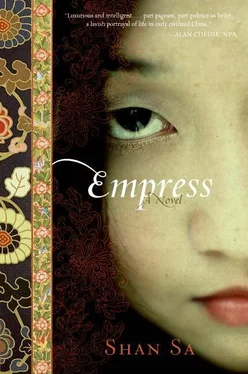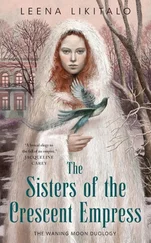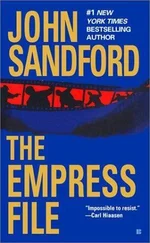Shan Sa - Empress
Здесь есть возможность читать онлайн «Shan Sa - Empress» весь текст электронной книги совершенно бесплатно (целиком полную версию без сокращений). В некоторых случаях можно слушать аудио, скачать через торрент в формате fb2 и присутствует краткое содержание. Жанр: Историческая проза, на английском языке. Описание произведения, (предисловие) а так же отзывы посетителей доступны на портале библиотеки ЛибКат.
- Название:Empress
- Автор:
- Жанр:
- Год:неизвестен
- ISBN:нет данных
- Рейтинг книги:5 / 5. Голосов: 1
-
Избранное:Добавить в избранное
- Отзывы:
-
Ваша оценка:
- 100
- 1
- 2
- 3
- 4
- 5
Empress: краткое содержание, описание и аннотация
Предлагаем к чтению аннотацию, описание, краткое содержание или предисловие (зависит от того, что написал сам автор книги «Empress»). Если вы не нашли необходимую информацию о книге — напишите в комментариях, мы постараемся отыскать её.
Empress — читать онлайн бесплатно полную книгу (весь текст) целиком
Ниже представлен текст книги, разбитый по страницам. Система сохранения места последней прочитанной страницы, позволяет с удобством читать онлайн бесплатно книгу «Empress», без необходимости каждый раз заново искать на чём Вы остановились. Поставьте закладку, и сможете в любой момент перейти на страницу, на которой закончили чтение.
Интервал:
Закладка:
Specialists in genealogy had proved that my clan, the Wus, were descended from the lineage of the King of Peace from the ancient Zhou dynasty. Twelve hundred years previously, this Great Ancestor had moved his capital from Long Peace to Luoyang, lying on its fertile plain and surrounded by steep mountains on three sides. The wide, peaceful River Luo flowed through the city where it was joined by many other rivers. Geomancy experts had seen happy prosperity in the configuration of the surrounding countryside, and strategists, liked its central location, protected it from Tatar invasions. Emperor Yang of the overthrown dynasty had raised millions of peasants to dig the Great Canal, setting off from the Eastern Gate and linking the five rivers of China.
In Long Peace there were sweat and dust and the heavy ruts left by carts. In Luoyang there were green canals, red sails, and the grinding of oars. Luoyang did not move, and the world came to it on the waves. Boats laden with grain, precious woods, bolts of silk, packages of tea, and jars of wine set off from the provinces and unloaded their wares before the imperial palace.
Luoyang had welcomed me as a triumphant empress. The city had been destroyed by war and had surrendered itself, naked, to my imagination. I had exercised my thoughts over every restored quayside, every new stretch of canal. I had redesigned the ramparts of its rectangular fortifications. I had reinstated its ten avenues bisected by ten wide boulevards and its 130 separate districts. I had planted the double row of scarlet grenadine trees and pink peach trees in the middle of the boulevards and constructed stone bridges shaped like rainbows and wooden bridges that opened to allow boats to pass with their sails filled with the wind. I had restored and enlarged the Forbidden City and the Imperial Park. I had built the three imperial temples to the east of the Palace to house the spirits of the Emperor Lordly Forebear, the Emperor Eternal Ancestor, and the Emperor Lordly Ancestor, called there from Long Peace. I had erected the Temple of Adoration where my forebears now received offerings on a par with those given to the three sovereigns of the dynasty.
Long Peace was banished. In Luoyang the wind blew over crimson peonies. From the top of the Pagoda of Contemplation, I could see the River Luo glittering in the middle of the Imperial Park. The Palaces of Spring and Autumn appeared in the depths of the forest where pavilions of cherry blossoms and terraces of orchid melted into the shadow. Galleries wound their way along the banks of rivers and became bridges launching out toward little islands, discs of emerald in the water. To the south, the low-lying city spread its panorama. Sailing ships glided across the sky. It was no longer clear where boats were setting out and where birds were flying off; tiled roofs and thatched roofs were smudges of turquoise and yellow between the canals. In the gap between blue and green on the horizon, a thread of black hovered. I could just make out the sacred valley through which the River Yi flowed. Devout Buddhists had dug thousands of caves along the cliffs on its right bank and had erected their idols in them over the centuries. My childhood wish had been granted there: A mountain had been sculpted and transformed into Buddha Vairocana of the Great Sun, accompanied by his bodhisattva servants. I had lent the giant statue my oval face, the thoughtful curve of my brow, my long slanting eyes, and my full-pouting lips, now immortalized in a distant smile.
Further away, there were forests and rivers, endless fields, and busy little towns. The golden and purple banners I had designed blew in the wind throughout the land of China. Men were dead. I was mistress of this eternal world.
LITTLE PHOENIX, HIS sickly cheeks and wan smile, was gradually erased by images of the Emperor Lordly Ancestor. Astride his horse, with his bow in his hand, he was a haughty and invincible warrior. On his throne, with his hands on his knees, wearing his ochre-yellow tunic and his cap of lacquered linen, he was dazzling in his majesty. At the top of Tai Mountain, wearing the crown with twenty-four tiers of jade pearls and the scarlet and black cloak embroidered with symbols of sovereignty, holding up the goblet of libations in his hands, he was the great priest of this earthly world.
Little Phoenix, the feverish adolescent and unfaithful husband. Little Phoenix, who had been my brother and my lover, had now become an effigy, a transparent glory, a sparkling light. His soul had wandered through the palace before joining the Emperor Eternal Ancestor in the heavens. They were both now a source of vague heat and icy inspiration to me, open to my contemplation but unattainable, on high.
They were both near to me and very far away; they had become stars.
My bed had been a desert for twenty years, and I had stumbled on Little Treasure as if onto an oasis. I forgot the damp embrace and herbal smell of medicinal infusions. I now savored his cool skin, firm muscles, and proud virility unashamedly. Love, which makes the weak weaker, had strengthened my powerful soul. I wanted to show the government that ecstasy by night robbed me of none of my lucidity by day.
New reforms were instigated: The best legal minds were summoned to examine the laws and compile new codes. In the past, the Mandarin Competitions had been organized to suit the government’s needs. I now wanted them to take place once a year and the final session to be held in my presence. I broadened the scope of the trials and decreed that it was no longer compulsory to submit a dissertation on the Great Classics. I included poetry-that music of the gods and window to our souls-as the most infallible test of talent.
A decree went out expressing my determination not to miss a single hint of genius: “The Empire’s prosperity is a duty for every one of us. Every individual-whether an official or of no distinction, nobleman or commoner, Chinese or foreign, gifted in the field of culture, economics, defense, education, justice, or major works-should present themselves to the recruiting officers without a letter of recommendation.”
I poached more time from recreational activities and wrote The Ethics of a Servant of the State and A New Warning to Imperial Officials, in which I made reflections on loyalty and competence. I published an essay on agriculture and had the largest astronomical sphere beneath the sky erected at the Northern Gate to the Palace. I diligently replied to the people’s requests thrown into the Urn of Truth. With one hand I managed the administration of the provinces, while with the other, I continued to weave a web of intrigue to weaken the Barbarian tribes in the west.
My reawakening to life stimulated the rebirth of the Empire. The years of famine and epidemics were forgotten. Grain stores were filled once more; there was abundant meat, game and fish in the markets. The generosity of Heaven and Earth inspired me to brave the heights before which my husband, the Sovereign Lordly Ancestor, had faltered. Above and beyond secular power, was the reign of the gods. Above and beyond the seal of Supreme Empress, was the scepter of a high priestess, the incarnation of Divine Justice.
In the fourth year of the Era of Lowered Arms and Joined Hands, I detailed a holy man, the master monk Scribe of Loyalty, to knock down the reception palace at the entrance to the Forbidden City and to build the Temple of Clarity on its ruins. This site would provide a home for the sacred sanctuary. This project had been abandoned in my husband’s time, but it would be my masterpiece. The construction of this temple would make all petty human squabbles meaningless. An entire empire, an entire people would be called up by a divine force and would burn with the desire to reach heaven. Exalted souls disdain suffering. Poverty-my enemy and my rival-would soon be reduced to ashes and dust.
Читать дальшеИнтервал:
Закладка:
Похожие книги на «Empress»
Представляем Вашему вниманию похожие книги на «Empress» списком для выбора. Мы отобрали схожую по названию и смыслу литературу в надежде предоставить читателям больше вариантов отыскать новые, интересные, ещё непрочитанные произведения.
Обсуждение, отзывы о книге «Empress» и просто собственные мнения читателей. Оставьте ваши комментарии, напишите, что Вы думаете о произведении, его смысле или главных героях. Укажите что конкретно понравилось, а что нет, и почему Вы так считаете.





